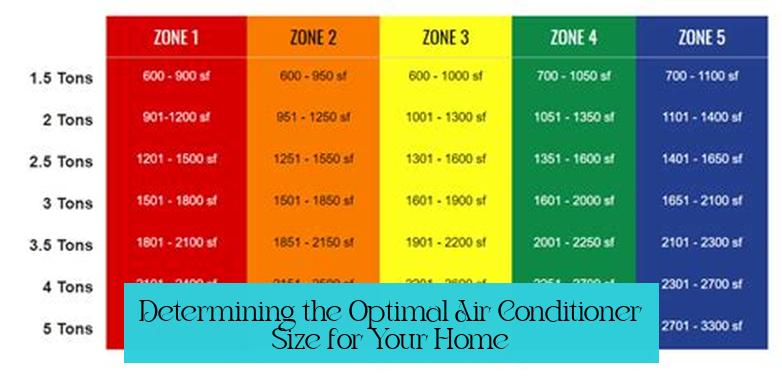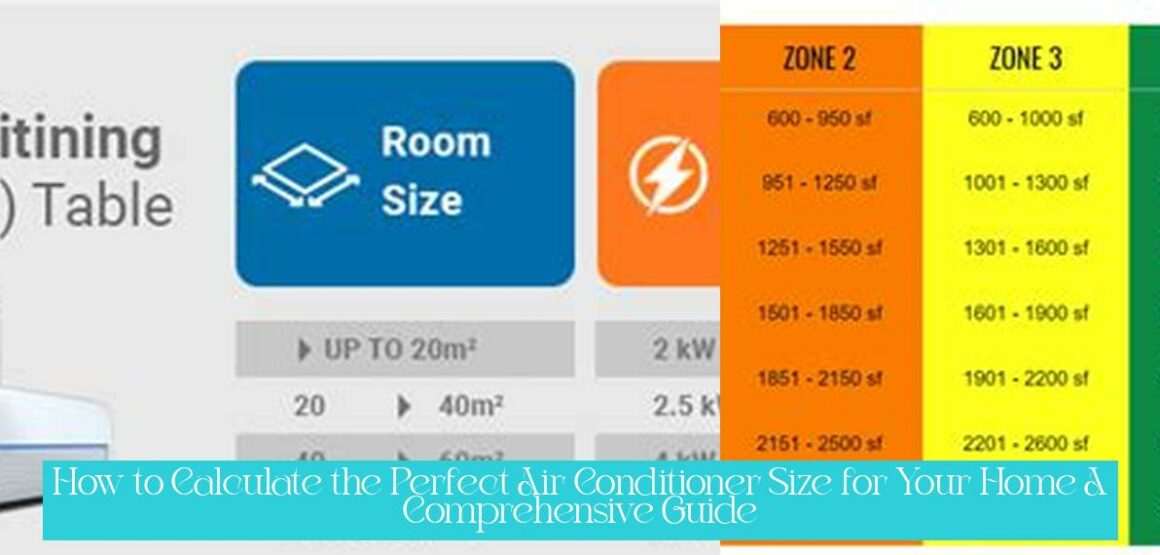Are you sweating over the daunting task of finding the perfect air conditioner size for your home? Look no further! In this comprehensive guide, we’ll uncover the secrets to calculating the ideal air conditioner size for your house. Say goodbye to the guesswork and hello to a cool, comfortable home with our expert tips and tricks. Let’s dive in and find the perfect fit for your cooling needs!
Key Takeaways
- Use a rule of thumb of around 20 BTUs per square foot of space to estimate cooling capacity needed for a room.
- For a 2000 sq ft house, a central AC unit of 3 tons or 36,000 BTU is typically needed.
- For a quick check, consider 1000 square feet per ton for newer houses to avoid oversizing the AC system.
- To cool a 600 sq ft space with an 8 ft ceiling, a 12000 BTU air conditioner is recommended.
- Calculate the size of the air conditioner needed by multiplying the length and width of the room and then multiplying it by 25 BTU.
- For a general estimate, start with 20 BTU for every square foot of the house to find the right size AC unit.
Determining the Optimal Air Conditioner Size for Your Home

Calculating the appropriate air conditioner size for your home is crucial to ensure efficient cooling and energy conservation. Oversizing the unit can lead to excessive energy consumption and insufficient cooling, while undersizing it will leave your home uncomfortably warm. To determine the ideal size, consider the following factors:
Square Footage: The size of your home is a primary determinant of the air conditioner’s capacity. A rule of thumb is to allocate 20 British Thermal Units (BTUs) per square foot of space. For instance, a 2,000-square-foot house typically requires a 3-ton or 36,000 BTU central AC unit.
Ceiling Height: High ceilings require more cooling power to maintain a comfortable temperature. For rooms with ceilings above 8 feet, increase the BTU calculation by 10%.
Insulation and Air Leakage: Well-insulated homes with minimal air leakage require less cooling capacity. Conversely, homes with poor insulation or drafts may need a larger unit.
Discover – Optimizing Comfort: What Size AC Do You Need for an 1800 Sq Ft House?
Also read Unlocking Affordability: The Ultimate 2.5 Times the Rent Calculator Guide for Renters and Landlords
Number of Windows and Doors: Large windows and doors allow heat to enter the home, increasing the cooling load. Consider the number and size of these openings when determining the AC size.
Calculating the BTU Requirements
Once you have considered the above factors, you can calculate the approximate BTU requirements for your home. Here are two methods:
Rule of Thumb Method: Multiply the square footage of your home by 20 BTUs per square foot. For example, a 1,500-square-foot home would need an air conditioner with a cooling capacity of 30,000 BTUs.
Manual J Calculation: This method involves a more detailed analysis of your home’s construction, insulation, and other factors that affect cooling load. It provides a more accurate estimate but requires specialized knowledge and software.
Choosing the Right AC Size

After calculating the BTU requirements, choose an air conditioner that closely matches that capacity. Avoid oversizing the unit, as this can lead to inefficient cooling, increased energy consumption, and premature wear on the system.
Benefits of Correct Sizing:
- Improved Comfort: An appropriately sized AC unit will maintain a consistent and comfortable temperature throughout your home.
- Energy Efficiency: A correctly sized unit operates at optimal efficiency, reducing energy consumption and lowering utility bills.
- Extended Lifespan: Properly sized air conditioners experience less stress and wear, extending their lifespan.
Consequences of Incorrect Sizing:
- Oversizing: Excessive cooling capacity can lead to short-cycle cooling, which reduces efficiency and increases wear. It can also cause discomfort due to uneven cooling.
- Undersizing: An undersized unit will struggle to cool the home effectively, resulting in warm and uncomfortable conditions.
How do I calculate the appropriate air conditioner size for my home?
To calculate the appropriate air conditioner size for your home, consider factors such as square footage, ceiling height, insulation, air leakage, and the number of windows and doors. Use a rule of thumb of 20 BTUs per square foot of space to estimate the cooling capacity needed for a room.
What factors should I consider when determining the ideal air conditioner size for my home?
When determining the ideal air conditioner size for your home, consider the square footage, ceiling height, insulation, air leakage, and the number of windows and doors. These factors influence the cooling load and capacity required for efficient cooling.
What are the two methods for calculating the BTU requirements for my home?
The two methods for calculating the BTU requirements for your home are the rule of thumb method, which involves multiplying the square footage by 20 BTUs per square foot, and the Manual J calculation, which provides a more detailed and accurate estimate but requires specialized knowledge and software.
How can I choose the right air conditioner size for my home?
After calculating the BTU requirements using the appropriate method, choose an air conditioner that closely matches that capacity. It’s important to select an air conditioner size that aligns with the calculated cooling capacity to ensure efficient cooling and energy conservation.
What size air conditioner do I need for a 2000 sq ft house?
For a 2000-square-foot house, a typical central AC unit size would be around 3 tons or 36,000 BTUs. This estimation is based on a rule of thumb of 20 BTUs per square foot of space to determine the cooling capacity needed for the house.
How can I calculate the size of the air conditioner needed for a room?
To calculate the size of the air conditioner needed for a room, multiply the length of the room by its width, and then multiply the result by 25 BTU. This will provide an estimate of the cooling capacity required for the room under different weather conditions.










